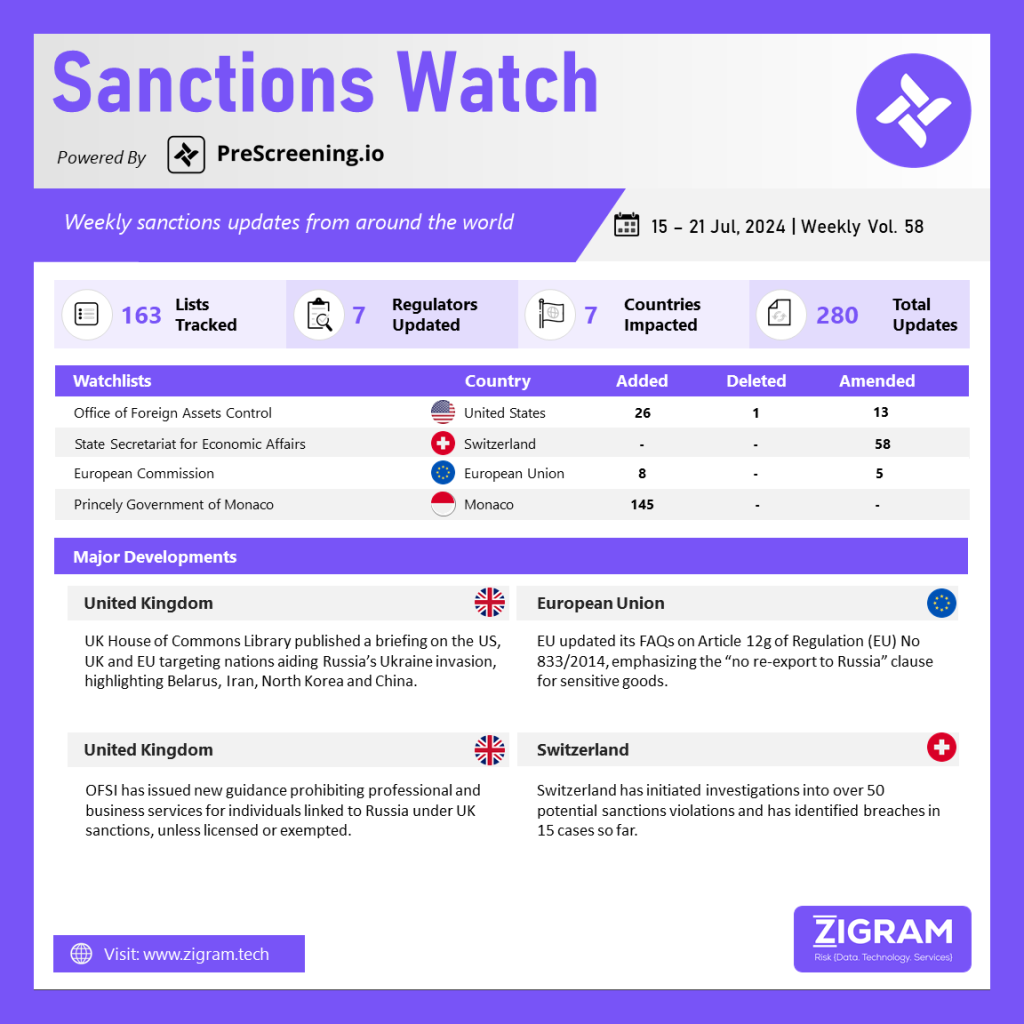Sanctions Watch Vol 58
In the latest edition of our Sanctions Watch weekly digest, we present significant updates on sanction watchlists and regulatory developments.
The UK House of Commons Library has released a research briefing analyzing the responses of the UK, US, and EU towards third countries that directly support Russia’s invasion of Ukraine. This briefing indicates that, although sanctions have not been broadly applied to countries continuing their trade with Russia, the US and its allies have intensified their focus on nations and organizations accused of aiding Russia in its war efforts or in circumventing sanctions.
The briefing particularly emphasizes Belarus, Iran, North Korea, and China, offering detailed analysis of the sanctions imposed by the US, UK, and EU on these countries. This analysis underscores the strategic efforts by Western nations to curtail support for Russia’s military actions and to enforce stringent measures against entities involved in facilitating these actions or bypassing the established sanctions framework. The briefing thus provides a comprehensive overview of the geopolitical and economic measures employed to address and mitigate external support for Russia.
On 20 July 2024, the EU updated its FAQs on “no re-export to Russia” clauses under Article 12g of Regulation (EU) No 833/2014, which prohibits re-exporting certain sensitive goods to Russia unless exemptions apply. Sensitive items include aviation goods, jet fuel, and firearms. All contracts concluded from 19 December 2023 must contain a “no re-export to Russia” clause. Contracts made before this date have a one-year transition period or until their expiry, whichever comes first, to include the clause.
This requirement applies to contracts with operators based in any non-EU country, except those listed in Annex VIII to Council Regulation (EU) No 833/2014. Council Regulation (EU) 2024/1745, part of the 14th Russia sanctions package, exempts public contracts with third-country public authorities or international organizations, and exporters must inform their member state’s competent authorities of such contracts.
OFSI has recently issued updated guidance concerning the provision of trust services under the UK’s Russian sanctions regime, now available in the UK Guidance section of their website. According to the FAQs provided, offering professional and business services to individuals connected with Russia is generally prohibited under these regulations unless explicitly permitted by a license or falls under a relevant exception (FAQ 35).
Furthermore, during an asset freeze, any assets must remain frozen even when trust services are being provided (FAQ 36). However, there is an exception within the trust services sanctions that allows for compliance with asset freezes. This exception applies in situations where actions concerning frozen assets are necessary, provided that either a designated person or the trustee obtains a license or utilizes an exception applicable to asset freezes.
Switzerland has initiated investigations into over 50 potential sanctions violations related to Russia, with 15 confirmed breaches so far, according to a government statement. Following Russia’s invasion of Ukraine in February 2022, Switzerland implemented sanctions in line with other Western nations, including new measures announced earlier this month. The State Secretariat for Economic Affairs (SECO) reported opening 56 proceedings, with approximately half dismissed and penalties imposed in 15 cases. The remaining cases are still under review. SECO has not disclosed the sectors or companies involved. Earlier this year, Switzerland established a specialized team to enforce these sanctions and ensure compliance.
Know more about the product: PreScreening.io
Click here to book a free demo.
- #UnitedKingdom
- #UnitedStates
- #FAQs
- #Prohibits
- #Regulation
- #SanctionsPackage
- #EuropeanUnion
- #Ukraine
- #Belarus
- #Iran
- #NorthKorea
- #China
- #MilitaryActions
- #SanctionsEnforcement
- #SanctionsMonitoringBoard
- #SanctionsRegimes
- #Export
- #SensitiveGoods
- #OFSI
- #SanctionsRegime
- #DesignatedPerson
- #AssetFreezes
- #Switzerland
- #SECO

